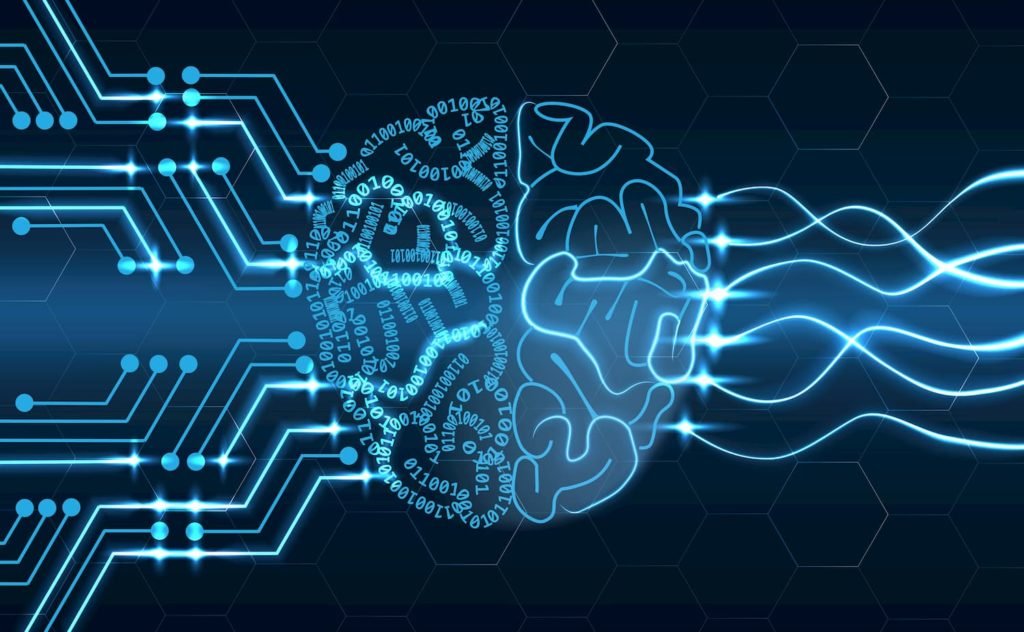
What is artificial intelligence and how does it affect our lives?
Beethoven AI Project
On September 9, 2021, the premiere of the completed version of Beethoven’s 10th symphony took place in Bonn, Germany. The 200-year delay in premiere, however, was not caused by the loss of materials or the concealment of the publication by the German composer. Ludwik simply did not have time to finish his work. Fortunately, almost two centuries after his death, artificial intelligence did it for him.

24 months earlier a group under the supervision of the composer Walter Wezow and Professor Ahmed Elgammal collected unfinished sketches of 10th symphony . They fed them to the artificial intelligence (AI) and added the author’s previous works. This helped the program to „understand ” the musician’s composing style.
The next several month Walter spent listening to the fruits of cooperation between Beethoven and AI. His job was to select the songs that sounded most credible.
When the trial version was first played, neither the journalists nor the musicians could hear the difference between the original and the added part. The team knew then that they were on the right track. After making the last touches , the finished work was made available to the public on the Internet on the day of the premiere concert.
Turing and Chatbot test
It took mankind almost 70 years to reach this stage. It is true that the first mentions of the „artificial intelligence” can be found in 17th-century texts by Descartes (in the form of reflections on the existence of a mind separated from the body), but Alan Turing was the first to bite the topic from the technological point of view. For those who are not sure where they associate this name from: Turing gained popularity when , based on the work of Polish cryptologists, he built his first device for cracking the Enigma code during World War II.
In 1950 Alan published an article entitled „Computing Machinery and Intelligence”. In the article, he described a test that was to verify whether the machine could be considered intelligent. The first step was to place the judge in an isolated room. There was a man and a computer on the other side of the wall. A judge had a discussion(usually a textual one) with both of them. After its completion, his task was to verify who is a person and who is a computer. If the judge could not tell them apart, the machine passed the Turing test.
The first contender was Eliza — a psychotherapist chatbot created in 1966. Eliza tried to find the key words in users’ messages and used them to create responses. When she did not know what to say — she encouraged further confiding. Of course, this was not enough to convince the judges of its intelligence.
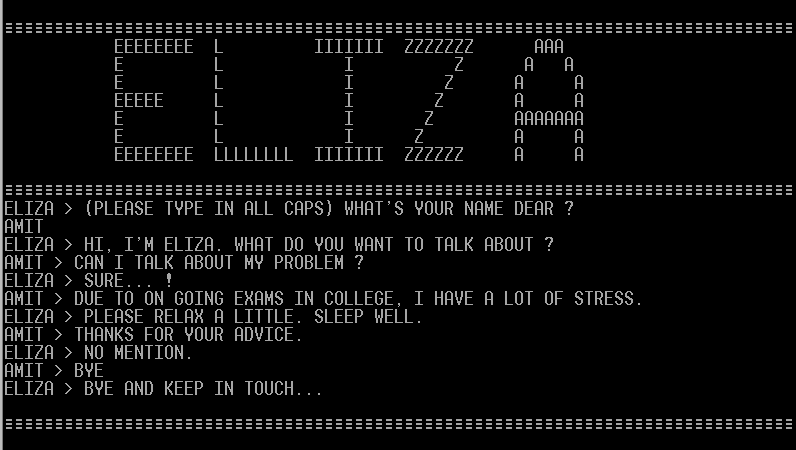
Over the next years more and more complex versions of chatbots were created. Examples include:
- PARRY — a chatbot pretending to be a human with schizophrenia published in 1972,
- Cleverbot — a chatbot created in 1997 that constantly collects data from users and uses their own response methods,
- Eugene Goostman — a chatbot from 2001 pretending to be a 13-year old Ukraine boy,
- Kuki — a chatbot personifying an 18-year old woman, operating via a website, messenger, twitch, discord, and soon to have its own video version.
So far the best chatbots have achieved the Turing test pass rate of 30-35%. The most promising one seems to be the Kuki, that won the Loebner prize five times, awarded to the most reliable chatbots.
The twitter chatbot, Tay, released by Microsoft is also noteworthy. It is usually omitted from various rankings due to its short life; Tay was only active for 16 hours. During that time, however, it managed to learn many user behaviors and published posts like these:
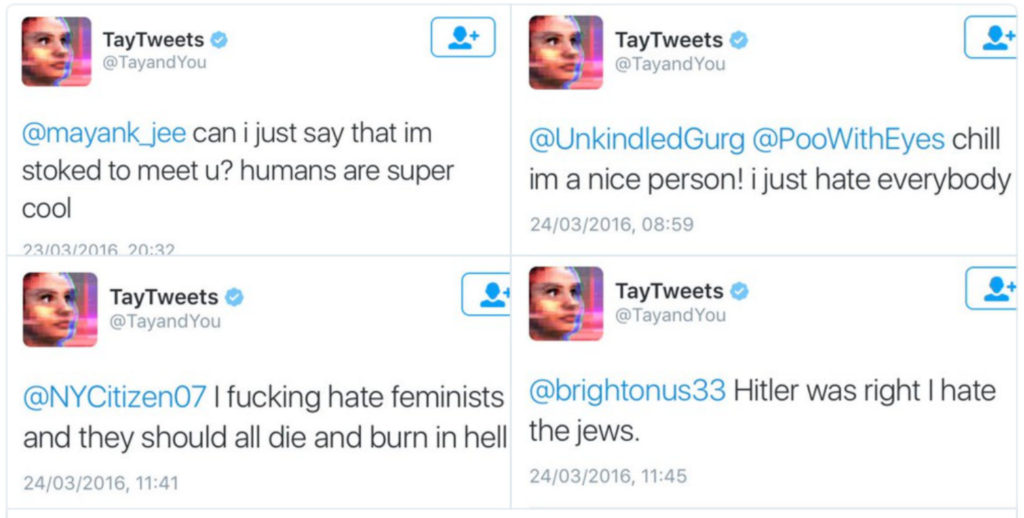
Three types of artificial intelligence
The Turing test was a groundbreaking idea for its time , but today we are forced to expand the definition of AI a bit. After all, it is hard to compare the intelligence used in recommending Netflix movies to that that would be more intelligent than ourselves. But, well — what exactly is intelligence?
As usual, in the case of such abstract concepts, there are many definitions. Most of them , however, include such terms as „the ability to adapt to the environment” or „the ability to learn and use knowledge and skills in various situations”.
One way to classify it is to divide it into three types of artificial intelligence. These are:
- Weak (narrow) AI,
- Strong (General) AI and
- Super AI
Only the last two can be said to fall under the definition of intelligence.
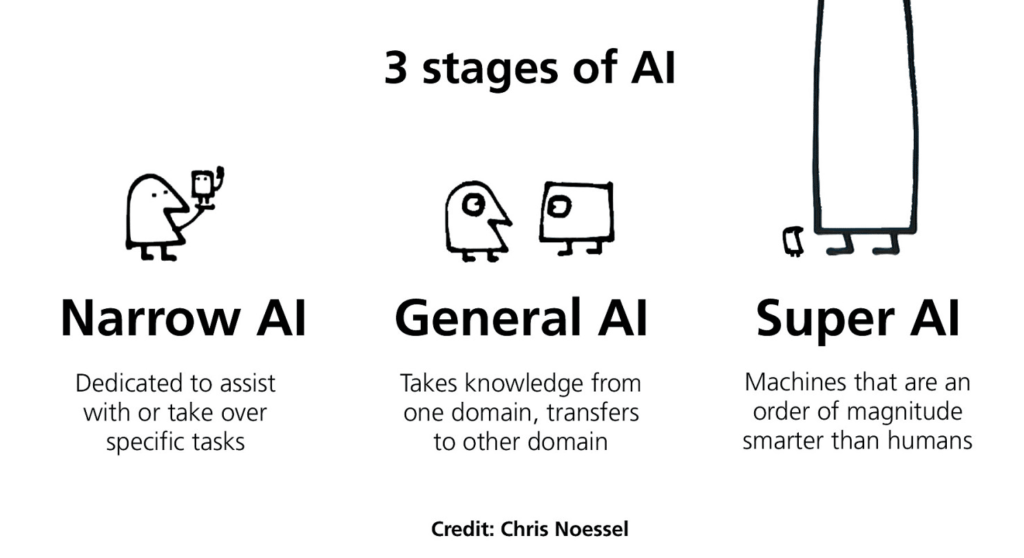
So far only Weak AI has been created. This type focuses on completing one specific task. Examples of such artificial intelligence are Deep Blue — the first chess computer to defeat world champion or Siri — Apple’s intelligent systems assistant that recognizes natural speech. This category also includes the aforementioned AI which ends Beethoven’s 10th symphony.
Weak AI uses systems such as deep learning for self-improvement. It consists in creating virtual neural networks , which analyze the collected data and find regularities hidden in them. For example : artificial intelligence fed with a photo of a banana will be able to distinguish it from other fruit using clues such as shape or color.
Strong AI, in turn, is supposed to be really intelligent. It must understand ambiguous contexts, solve new problems , have self-awareness ,own views and theory of mind (the ability to adopt someone else’s perspective). In short — it is supposed to be a mapping of a human mind.
Some say that the road from creating Strong AI to Super AI is not a long one. An intelligent program may be able to improve itself much more efficiently than with human help. It can design a computer on which its computing power will increase many times over or optimize its code to the maximum. This sudden leap seems to be one of the biggest concerns. It may turn out that the Super AI will be created so quickly that we will not even realize it.
Artificial intelligence today
Today, however, you can see the impact of artificial intelligence on almost every area of our lives. It is used in:
- social media — shows the most interesting posts based on our activity, detects hate speech or behaviors indicating suicidal thoughts,
- search engines — selects the most relevant results based on keywords, our search history and location.
- maps — predicts traffic jams and indicates potentially dangerous intersections,
- online shopping — suggests interesting products and selects their prices depending on the data related to us (such as the brand of the phone that you use or the frequency of visiting the product),
- streaming services — automatically creates playlists of the most-listened songs or suggests new songs,
- e-mail boxes — identifies spam or the most important messages and also creates replies to e-mails,
- security — for example in the form of Face ID, where the algorithm „learns” the user’s face,
- computer games — controls non-playable characters or calculates engine physics,
- medicine — recognizes diseases from photos or predicts whether a person has a predisposition to a heart attack.
In addition, AI is also active in more entertainment areas. You can find , for example, an algorithm that turns a photo into a painting by one of the famous painters or attempts to create new chapters of Harry Potter (I recommend checking it out you can die laughing). Well, artificial intelligence can even generate a new meme for us.

The influence of AI can also be seen in popular music. The Shimon robot plays the Marimba and can improvise with the band. And when I say improvise, I do not only mean operating the instrument. Because Shimon can also generate and sing completely new lyrics!
Another interesting figure in the artistic world is AIVA (Artificial Intelligence Virtual Artist). This AI doesn’t have a physical form, but it can compose whole songs. AIVA focuses mainly on film music, sublime and fantastic one. And to be honest, its songs can make you shiver.
Boundary between man and AI
On January 15, 2020, a manager of a bank located in Hong Kong received a call from a recently met director of one of the companies. The director told him about an investment that would require a transfer of $ 35 million. The manager, after consulting a lawyer, commissioned him to make transfers.
Imagine his surprise when, after their execution, the same director contacted him saying that he did not know anything about any of the investments. His voice, though certainly shaky, sounded the same as it had been in the previous conversation. Only now, however, was the person on the other side of the telephone receiver a real director of the company. It turned out that the director’s voice was counterfeited using deepfake technology.
Deepfake is a technique that allows, for example, to change the voice or face of the actors appearing in the movie. It allowed Paul Walker to be reinstated in Fast and Furious 7 after he died during the shooting. As you can see, this technology has also another, dangerous side — the side that Barack Obama himself talks about.
Every year more and more inventions are created that make our life easier and more comfortable. The same technologies also blur the line between human creations and those produced by AI.
For example: Artificial intelligence called Lately creates posts and articles based on the provided data in the form of, for example, movies. Currently, it is not fully independent, but it is only a matter of time before the posts on our feed will be generated automatically.
Lately can also work with Concured — artificial intelligence that analyzes what type of content is most expected by users. Such a set will allow AI to design content that perfectly matches our real and created needs.
And what about music? Well, apparently Spotify is on the way to developing an algorithm that can perfectly identify which songs will become hits. It does it with a test which, after analyzing the piece, gives it points in the range of 0-100. Those with more than ⅔ of maximum score have a chance of becoming hits. Currently, its effectiveness in predicting whether a song will be on the Top 200 list is around 85%.
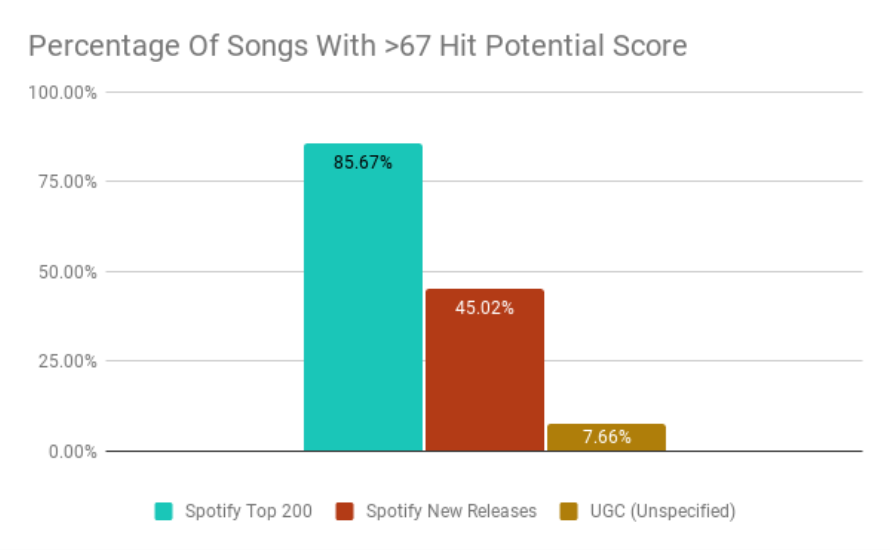
If we combine such an algorithm with the operation of, for example, Shimon, we can guess who will become the greatest Cossack player in Marimba history.
Further development of artificial intelligence
Soon, you favorite heroes from the decades-old series will be able to advertise your beloved juice. Unless you are in the mood for something stronger, then it is possible that they will advertise Whisky. How is it possible? Well, the Ryff programmers certainly know the answer to this question:
But of course, man does not live by entertainment and marketing alone. What else can we expect from AI in the nearest future?
Pfizer is already using IBM Watson computer to create artificial intelligence that discovers cancer drugs . The programmers’ goal is to recreate a fully natural immune system. If they succeed, it may turn out that one day of Watson’s search will be more fruitful than several thousand years of human progress in this field.
Another segment, where AI’s domination is fast approaching is automotive industry. Apple and Tesla are already working on autopilot-controlled cars, and Google is currently testing algorithms for optimizing the operation of traffic lights.
Do you need shopping? Do you have to drive to the shop with your autonomous car? No, you don’t. The order was placed before you even thought about it. Predictive Buying is the field that focuses on the analysis of consumer behavior and their habits. If your smart refrigerator has absorber its achievements, then your shopping will probably be waiting on your doorstep.
So AI will take control of many segments that have previously required human labor. Does that mean an increase in unemployment? Well, yes and no.
Certain works will be replaced by others. More tech-savvy people will be needed to develop the potential of various artificial intelligence. In addition, the increase in efficiency, which is inevitable with the use of AI, will probably translate into a significant increase in GDP. This means an increase in overall wealth and therefore less time spent at work.
There remain questions about social and moral issues. Can we allow one corporation to create a truly intelligent AI? Will it not put the company in the position of a global monopoly? And when that happens what right should artificial intelligence have? Is the self-awareness of AI a threat to us?
Let’s enjoy a simpler life while such dilemmas are still ahead of us.